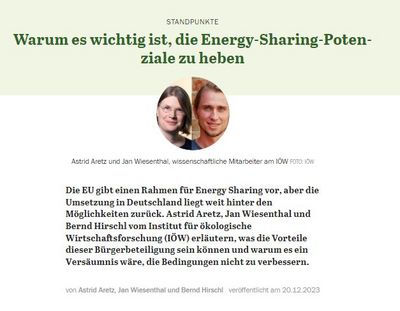Why we need to leverage the potential of energy sharing! Tagesspiegel Background – Points of view
The EU provides a framework for energy sharing, but the current implementation in Germany lags far behind the possibilities. The reform of the electricity market, which was agreed by the EU Parliament in December 2023, could give new impetus to the discussion on the design of implementation. Energy sharing was also included in this and was further specified and the regulatory framework expanded. However, there is still a large degree of freedom in the implementation into national law, which Germany should make use of. With the new Renewable Energy Directive (RED III) in November 2023, the European Union once again exerted pressure on the member states to accelerate the expansion of renewable energies. From now on, expansion is in the overriding public interest and various instruments must be implemented to achieve this. The role of citizens remains unchanged, as their involvement is seen as increasingly important for further expansion.
In Germany, there are already various opportunities for participation, for example in energy communities, privately owned wind-farms or by installing a solar system on your own roof. However, there is still no framework in which members of renewable energy communities can also share the energy produced in their own systems. Energy sharing could create an instrument that, in addition to building-related self-supply, would allow significantly more scope for near-consumption generation in a larger radius via the distribution grid. The authors explain what the advantages of this citizen participation would be and why it would be a failure not to improve the conditions.



